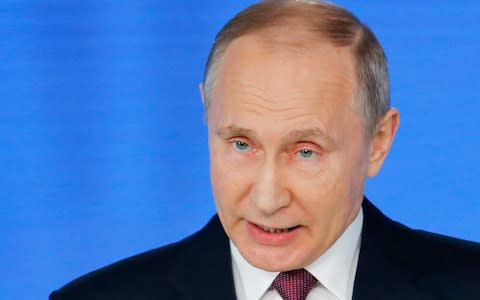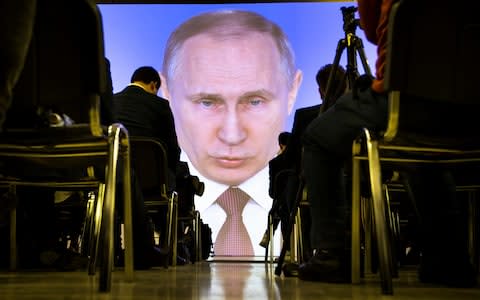Vladimir Putin claims Russia has developed nuclear weapons 'invulnerable' to US missile defence

Vladimir Putin said Russia has tested high-tech nuclear weapons invulnerable to US missile defence in a defiant speech before he stands for re-election this month.
In a state-of-the-nation address to top officials, Mr Putin made his most forceful declaration yet of Russia's military might. He said the country was developing a new generation of deadly weapons able to penetrate missile defences, including a nuclear-powered cruise missile with “unlimited range,” an underwater nuclear drone and a “practically invulnerable” hypersonic warhead that travels “like a ball of fire”.
Moscow has also tested its long-awaited Sarmat heavy intercontinental ballistic missile, which will fly farther and carry more warheads than its predecessors, he said.
“Russia remained a nuclear power, but no one wanted to speak with us. No one wanted to listen to us. Listen to us now,” Mr Putin said to enthusiastic applause from the audience.
The speech raised the spectre of a new arms race, as Donald Trump has similarly promised to expand the US arsenal and issued a nuclear arms policy this month aimed at countering Russian modernisation.
Responding to Mr Putin's speech, UK defence secretary Gavin Williamson accused Russia of choosing “a path of escalation and provocation”.

“We are facing intensifying threats to our way of life and this development is another reminder to not let down our guard,” he said.
But a US official told CNN that Russia's nuclear-powered cruise missile tests had ended in crashes
'Like a ball of fire' | New strategic weapons announced by Vladimir Putin
Although he touched on economic problems, the president's nuclear sabre-rattling soon shifted attention to the assertive foreign policy that has been popular with Russians despite Western sanctions.
Mr Putin complained bitterly about the US withdrawal from the anti-ballistic missile treaty in 2002 and its development of missile defence installations in Romania and Poland, which Moscow has long said will upend the strategic balance.
Since its warnings about missile defence had not been heeded, Russia had created new arms to ramp up its nuclear deterrent and “annul the strategic advantage” of the West, he said.
Mr Putin repeatedly paused to display videos of missile launches, explosions and flight trajectories. The clunky computer graphics would have been almost comical if not for the many unsettling images of targeted attacks and missiles heading toward North America. One showed warheads raining down on Florida.

The sheer bombast of this military muscle-flexing was unprecedented for the Russian president, as was the peek he offered through the veil of secrecy around the country's latest arms. He even announced an online contest to choose a name for an underwater drone able to carry a nuclear warhead, which was shown blowing up a destroyer in a video.
Previously the underwater drone had only been known from a piece of paper caught by a wandering television camera during a defence officials' meeting.
At Putin's speech they're literally showing videos of new ballistic missiles heading toward the United States as he promises to "overcome misile defense" pic.twitter.com/iMojufntMT
— Alec Luhn (@ASLuhn) March 1, 2018
“The sanctions to constrain Russia's development, including in the military sphere... they didn't work out,” Mr Putin said. “They haven't been been able to contain Russia. They need to realise this… Stop rocking the boat in which we all sit.”
He also vowed that incidents like the death of pilot Roman Filipov, who blew himself up with a grenade after being forced to bail out over enemy territory in Syria last month, “will never happen again,” drawing a standing ovation.
The aggressive military declarations were a departure from the first half of his speech, which focused on social problems and improving people's quality of life.

The remarks are being seen as his vision for a next term, which he is almost certain to win. Mr Putin has not put forth a campaign platform and been largely absent from the race so far.
Among a raft of ambitious goals, the president promised to cut poverty in half in the next six years, saying that the 20 million Russians below the poverty line was too many. He also called for a 50 per cent increase in GDP per capita by 2025.
He said the top priority should be the well-being of Russians and their families, calling for a “leap forward in the quality of people's lives, the modernisation of technologies, government management”.
At a glance | Russian presidential election 2018
“Russia has realised its foreign policy and defence potential, but in terms of people's personal growth we haven't reached our full abilities. We should do this and we will do this,” Mr Putin said to applause from a packed hall in the Manezh centre next to the Kremlin.
“Technological development” and “digital economy” were the latest watchwords from the Russian leader, who has tentatively embraced innovations like blockchain while also cracking down on dissent on the web. He said Russia should be a country “open to the world, to new ideas and initiatives”.
“We should increase the space for freedom in all spheres and strengthen democracy,” said Mr Putin, whose expected victory in the March 18 election is to keep him in power for more than a quarter-century, longer than Joseph Stalin.
Longest serving Russian leaders
The state-of-the-nation address had been repeatedly postponed since December.
As he spoke, the president paused frequently, not just for clapping but also to cough and gulp from a cup on the podium.
When Mr Putin disappeared from public for nearly two weeks last month, his spokesman said he had come down with a “cold,” a rare admission from an administration that has constantly stressed the leader's unfailing robust health.
